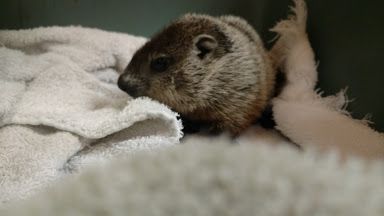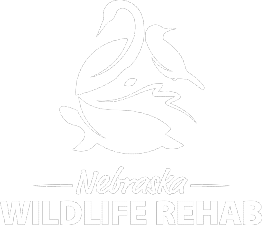
Many of you have been kindly calling and writing over the past 24 hours to ask if our Wildlife Center along the Platte River in Louisville, NE is safe and asking what you can do to help wildlife during this difficult time. Because of that, we decided to share some information on our site, by e-mail, and by social media.
First, please know that yes, our Wildlife Center in Louisville is indeed on/near the floodplain, and in minor floods, often takes on water. We do expect problems in the building in the coming days. Fortunately for us right now, all of our animals have been evacuated from the Wildlife Center since early December due to needed renovations that have left the building unusable for the foreseeable future. If the building floods, we will lose a large amount of equipment and supplies – but those things are replaceable and not as important as the animals. All of our patients are currently being cared for at our second site in Washington County, which is well out of harm’s way.
In the coming weeks it is likely that we will share with you plans to move in the spring or early summer, and where our public Wildlife Center will be. We might need your help getting to our goal, and hope that you’ll hang with us until we have news we are ready to share.
Second, it is true that this flooding is devastation to wildlife, just as it is to humans and livestock. We’d like to share a few tips with you about wildlife and floods:
Your Safety Comes First
Do not ever put yourself in harm’s way to save a wild animal. As we tell our volunteers and staff, more animals will be saved over your lifetime if you are here to rescue them and advocate for them. You need to protect yourself first!
Babies in Dens
This winter was long and hard, leaving many wild animals starting spring at a deficit. In addition to that, many wild mammals have babies they are caring for right now. We are particularly concerned for the ground burrowing mammals, including badgers, woodchucks, coyotes, foxes, and rabbits. All of their dens and nests are susceptible to flooding. If mother animals can’t move their babies in time, they are sometimes floated away in flood waters. If you find a live baby mammal in water or laying alone and cold, it needs immediate help. Use something to cover your hands (gloves or a towel) and pick up the baby. Put it in cardboard box and get it warm using a plastic bottle full of hot water or a heating pad set on low. Call us immediately at 402-234-2473 for assistance. (Do not stick your hands in a den!)
Moms Moving Babies
Foxes and coyotes in particular are working right now to move kits and pups out of harm’s way. Please be particularly attentive when you are driving and give these moms a chance when they are crossing roads.
Please also have some extra patience when you see these animals out during the daytime and travelling through your yard. Know that they are struggling to protect and feed their young, in an area where floodwaters may be causing dwindling resources.
Falling Trees
When the ground gets saturated with water as our ground is now, trees often uproot and fall. Squirrels and raccons have their babies in trees right now, and if a tree comes down in your yard, it is a good idea to see if any of these animals were affected.
If you find healthy and warm baby squirrels or raccoons, place them in a shallow box with a t-shirt or sheet and give them a source of warmth, like a plastic water bottle filled with hot water. Leave them as close to the base of the tree as possible (during the day for squirrels and at night for raccoons) and leave the area, giving the mother animal 4-6 hours to retrieve her young. If the mother doesn’t retrieve them, they will need to come to us for care.
If you find babies that are cold or listless, warm them up as above and call us immediately at 402-234-2473.
Opossums in Pouches
Opossums also have babies in their pouches right now, and will be travelling more extensively out of territories affected by floodwaters. Please “give them a brake” as well and watch out when driving, particularly at night. If you find a dead opossum on the road you can check the pouch for babies (wear a glove) that have survived the impact. Wrap the babies loosely in a t-shirt, put them in a box with a warm water bottle, and call us.
Final Notes from the Canadian Wildlife Federation
If you live in an area where flooding has occurred, please be aware of wildlife that may be displaced as a result of the flooding. Flooded habitats can force wildlife to seek temporary refuge in areas where they might not normally be found.
We encourage you to minimize your contact with the animals as they may be under duress and in survival mode:
Do stay away from areas where wildlife have taken refuge.
Do not interact with or feed wild animals.
Do avoid roads in flooded areas to reduce the interference with wildlife and possible wildlife collisions.
Your kindness, patience, and vigilance go a long way to helping wildlife. Together we can help the animals survive into what will hopefully be an easier spring.
Thank you so much for your care and support!
The Staff and Volunteers of NWRI

